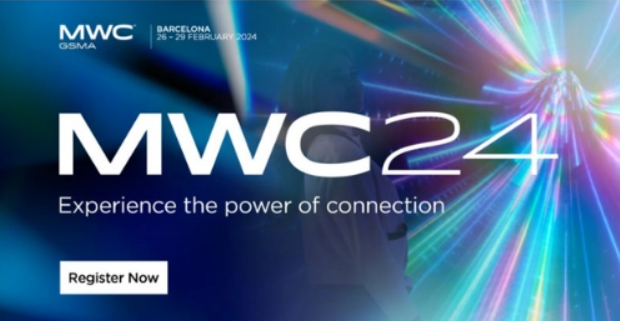Notícias

BIOFIN-UE promove a inovação no financiamento da biodiversidade na reunião plenária de 2025
LEIDEN, Holanda - maio de 2025 - O projeto BIOFIN-EU, financiado pela UE, realizou a sua reunião plenária anual no Naturalis Biodiversity Center, reunindo representantes de todos os 13 parceiros em 10 países europeus para impulsionar a inovação no financiamento da biodiversidade. A reunião de três dias foi um marco importante na missão do BIOFIN-EU de desenvolver a estrutura e a tecnologia que tornarão os investimentos positivos para a biodiversidade mais atraentes e acessíveis às instituições financeiras. Principais resultados e destaques: Ferramenta de apoio à decisão: Uma nova ferramenta de apoio à decisão para instituições financeiras que inclui módulos de avaliação da biodiversidade, transparência de dados e modelação de riscos Data for Nature-Based Solutions (NbS): Progresso na identificação de necessidades críticas de dados para investimentos em soluções baseadas na natureza (NbS) Transforming Agricultural Finance: Foco na transformação dos empréstimos agrícolas através da integração de dados sobre biodiversidade Envolvimento do público e Fórum da sociedade civil: A reunião deu prioridade ao envolvimento do público, lançando as bases para um Fórum da Sociedade Civil para garantir o desenvolvimento de políticas transparentes. Taxonomia simplificada das finanças sustentáveis: Os investigadores abordaram os desafios de escalar soluções ecológicas e de se alinharem com a taxonomia simplificada das finanças sustentáveis. Aceleradores de competências: Desenvolvimento de aceleradores de competências para o sector financeiro europeu, combinando investigação de ponta com vias de implementação práticas.
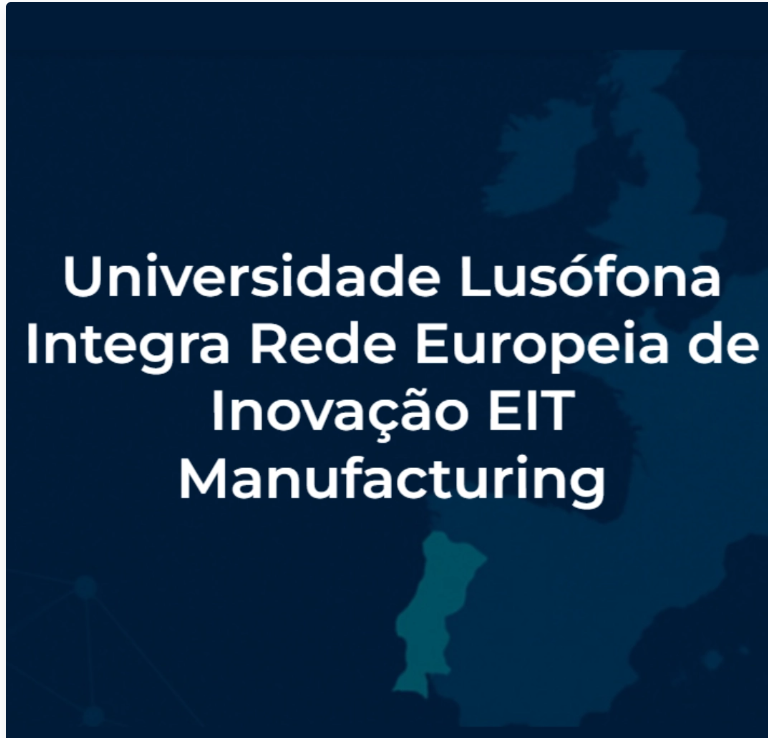
Parceria estratégica com a rede europeia EIT Manufacturing
Parceria estratégica reforça o compromisso da universidade com a inovação, a digitalização e a sustentabilidade na indústria europeia A Universidade Lusófona tem o prazer de anunciar a sua integração como membro da EIT Manufacturing, uma das principais Comunidades de Inovação e Conhecimento (KIC) do Instituto Europeu de Inovação e Tecnologia (EIT). Esta parceria estratégica posiciona a Universidade no epicentro da transformação digital e sustentável da indústria europeia, consolidando o seu compromisso com a inovação, a educação e o empreendedorismo. A EIT Manufacturing reúne mais de 50 organizações de 17 países europeus, incluindo empresas líderes, universidades e centros de investigação, com o objetivo de impulsionar a competitividade da indústria europeia através de ecossistemas de inovação colaborativa. Em Portugal, destacam-se como parceiros-chave o INESC TEC (Instituto de Engenharia de Sistemas e Computadores, Tecnologia e Ciência) e a SONAE. A participação da Universidade Lusófona, representada pelos investigadores do centro de investigação RCM2+ (Faculdade de Engenharia), nesta rede europeia permitirá o desenvolvimento de projetos inovadores, programas de formação avançada e iniciativas de apoio a empresas e start-ups inovadoras. Estes projetos estarão alinhados com os objetivos estratégicos da EIT Manufacturing, como a digitalização da produção e a promoção da sustentabilidade ambiental e social. Esta integração reforça o papel da Universidade Lusófona como um agente ativo na promoção da inovação e da competitividade industrial, ao mesmo tempo que contribui para a formação de profissionais altamente qualificados e para a criação de soluções tecnológicas de elevado valor acrescentado.
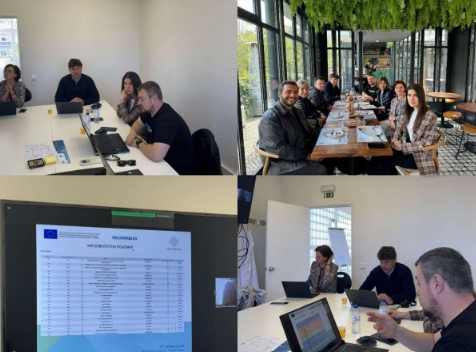
3.º Workshop do projeto PhytoAPP no DeepTechLab da Universidade Lusófona
O 3.o Workshop do projeto PhytoAPP teve lugar no dia 15 de abril de 2025 no DeepTechLab da Universidade Lusófona, em Lisboa. O evento foi organizado pelo DTL/Lusófona em colaboração com o NANOTECHCENTER. O projeto PhytoAPP é financiado pela Agência Executiva Europeia de Investigação da Comissão Europeia e é coordenado pelo Professor Sergiy Lyubchyk, da Universidade Lusófona. O principal objetivo do workshop foi avaliar o estado atual e o progresso dos Work Packages (WPs) do projeto, bem como discutir direções estratégicas, com especial enfoque no cronograma restante até à conclusão do projeto, prevista para fevereiro de 2026. Foram realizadas apresentações detalhadas, principalmente pelos líderes dos WPs, que destacaram as principais conquistas, atividades em curso, desafios enfrentados e planos futuros. O workshop terminou com uma mesa-redonda centrada na integração entre os diferentes WPs, na troca de conhecimentos e no planeamento conjunto. Foram discutidos temas importantes como as próximas atividades científicas, mobilidade, ações de disseminação e preparativos para a conferência final do projeto. Estratégias de comunicação e ferramentas de visibilidade também foram abordadas, com o objetivo de maximizar o impacto e alcance do projeto. O evento contou com a participação de representantes de todas as instituições parceiras do consórcio, presencialmente ou por via remota. As seguintes instituições estiveram representadas: COFAC/Universidade Lusófona (Ulusófona, PT), NANOTECHCENTER LLC (UA), Instituto de Física Experimental da Academia Eslovaca de Ciências (IEP, SK), University of Oxford (UOXF, UK), Cascatachuva Lda (PT), a Universidade Estatal Korkyt Ata Kyzylorda (KKSU, KZ), e o Centro Nacional de Investigação Nuclear CJSC (NNRC, AZ). O Professor Sergiy Lyubchyk, coordenador do projeto e investigador do RCM2+, e a Professora Svitlana Lyubchyk, docente do Mestrado em Engenharia e Gestão Industrial da Universidade Lusófona e também investigadora do RCM2+, estiveram presentes na reunião. O projeto PhytoAPP tem como objetivo desenvolver inibidores da formação de fibrilas amiloides para prevenir e tratar doenças como Alzheimer e Parkinson. Utilizando a nanotecnologia, o projeto visa ultrapassar limitações dos fitoquímicos, como a baixa solubilidade em água, melhorando a sua biodisponibilidade, estabilidade e reduzindo a toxicidade. O trabalho inclui a síntese de fitocomplexos nanoativados, testes in vitro e in vivo, e a preparação para a produção em escala de nanofármacos, incluindo o desenvolvimento de uma linha-piloto e testes clínicos.
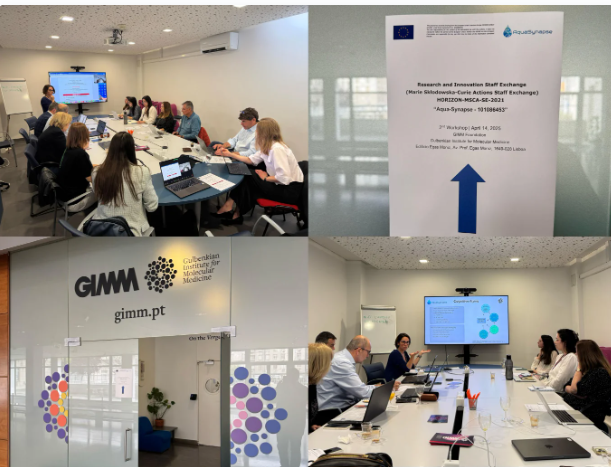
2.º Workshop Aqua-Synapse na Fundação GIMM, em Lisboa
No dia 14 de abril de 2025, realizou-se em Lisboa, Portugal, o 2.º Workshop do projeto Aqua-Synapse, nas instalações da Fundação GIMM – Instituto Gulbenkian de Medicina Molecular (GIMM). O Aqua-Synapse é um projeto financiado pela Agência Executiva Europeia de Investigação da Comissão Europeia e é coordenado pelo Professor Sergiy Lyubchyk, da Universidade Lusófona*. O principal objetivo deste segundo workshop foi rever e discutir o estado atual da arte e as perspetivas futuras de cada Pacote de Trabalho, após a conclusão da primeira fase do projeto (RP1). O evento contou com apresentações detalhadas sobre o progresso e os resultados dos seguintes Work Packages (WP): WP1: Espectroscopia metabólica de deutério e imagiologia metabólica de deutério; WP2: Impacto do deutério no equilíbrio excitatório/inibitório (E/I) num modelo de rede neuronal humana; WP3: Avaliação dos efeitos da depleção de deutério em modelos animais da síndrome metabólica; WP4: Avaliação do impacto da depleção de deutério em modelos animais de envelhecimento; WP5: Produção de amostras de água com baixo teor de deutério e controlo, e monitorização do conteúdo de deutério em tecidos experimentais; WP6: Gestão do projeto e atividades de disseminação. Os team leaders de cada Work Package apresentaram os progressos e conclusões da sua responsabilidade. O workshop terminou com uma mesa-redonda que promoveu a troca de conhecimentos e o planeamento estratégico dos próximos passos do projeto, incluindo mobilidade, investigação científica e resultados, esforços de comunicação e disseminação, e a possível integração de uma nova empresa no consórcio. Este workshop foi organizado pelo GIMM em colaboração com a Universidade Lusófona. Todos os parceiros do consórcio estiveram representados, presencialmente ou online, incluindo: Universidade Lusófona/COFAC (PT); Hospital Universitário de Würzburg (DE); HYD LLC. para Investigação Oncológica e Desenvolvimento de Fármacos (HU); Instituto Gulbenkian de Ciência Molecular (PT); Universidade de Oxford (UK). Os professores Sergiy Lyubchyk, coordenador do projeto e investigador no RCM2+, e Svitlana Lyubchyk, docente do mestrado de Engenharia e Gestão Industrial na Universidade Lusófona e também investigadora no RCM2+ estiveram presentes no evento. O projeto Aqua-Synapse tem como objetivo investigar os mecanismos pelos quais a água com baixo teor de deutério pode ter efeitos benéficos na saúde humana, nomeadamente em doenças como o cancro. Estudos indicam que altas concentrações de deutério podem causar disfunção mitocondrial, enquanto concentrações mais baixas parecem ter efeitos positivos. No entanto, ainda não se sabe exatamente a que níveis essas melhorias metabólicas e comportamentais se tornam evidentes. O projeto procura confirmar esta hipótese e criar formas de medir esses benefícios.
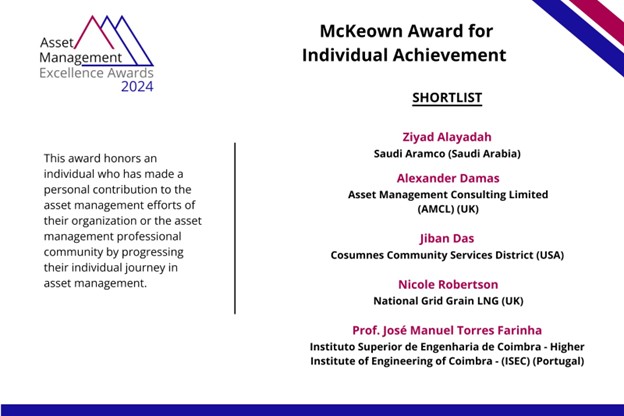
Asset Management Excellence Awards 2024
O Institute of Asset Management (IAM) é o organismo profissional internacional para profissionais de gestão de ativos. O IAM desenvolve os conhecimentos e as melhores práticas de gestão de ativos e promove a sensibilização para os benefícios da disciplina de gestão de ativos para os cidadãos, as organizações e a sociedade em geral. O IAM foi criado em 1994 e conta atualmente com mais de 2000 membros individuais e 300 membros empresariais e uma rede de mais de 46 000 pessoas em todo o mundo. O Institute of Asset Management (IAM) é um organismo profissional sem fins lucrativos que opera a nível global, em todo o mundo. José Manuel Torres Farinha foi nomeado para a shortlist do McKeown Award for Individual Achievement.
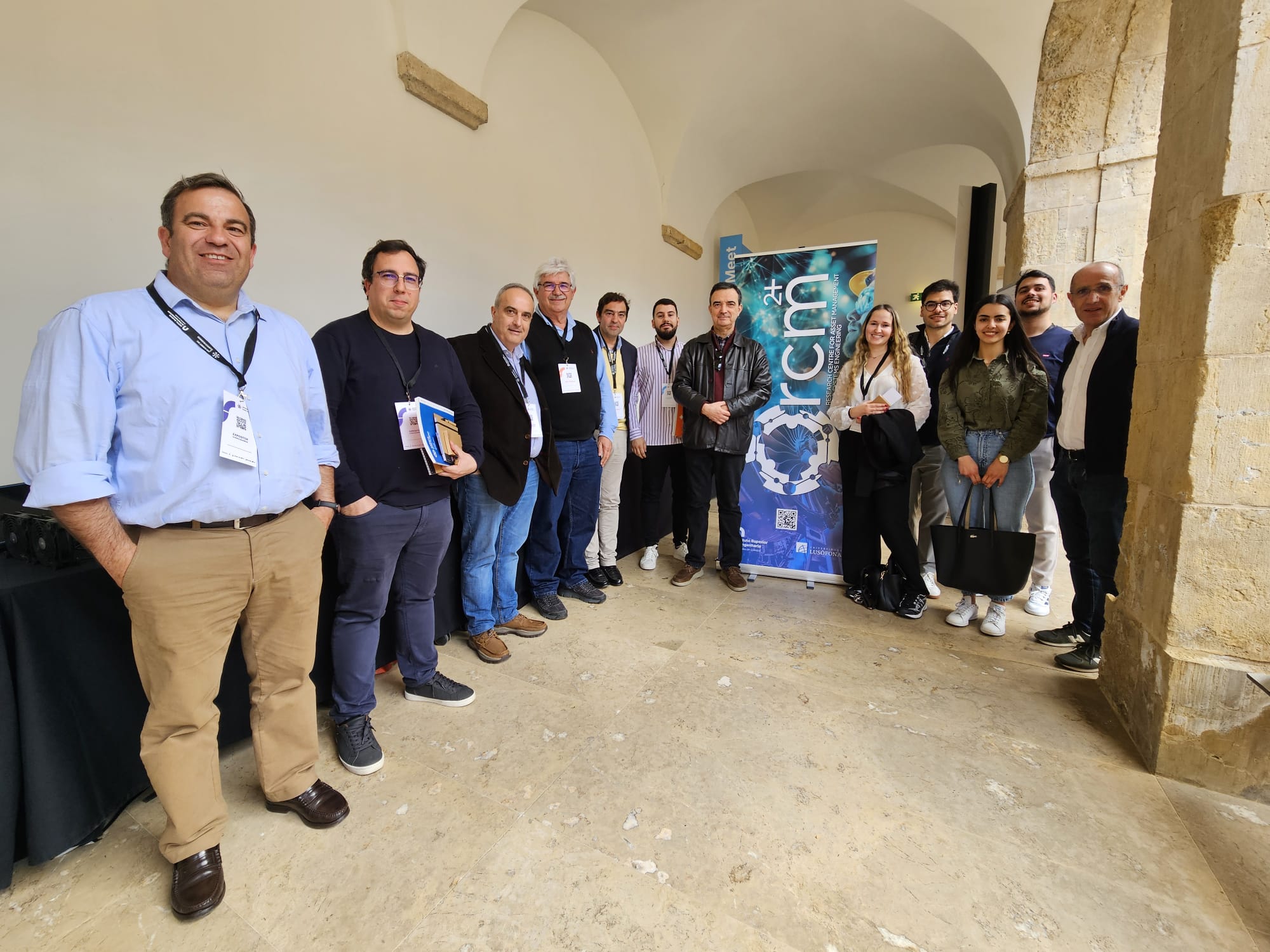
RCM2+ no Job Summit IPC & Science2Business
O RCM2+ participou no Job Summit IPC & Science2Business, que decorreu no dia 1 de abril, no Convento de São Francisco, em Coimbra. Este é um dia dedicado ao conhecimento, networking e inovação, com empresas e profissionais. É, portanto, uma oportunidade para explorar as novas tendências do mercado de trabalho e descobrir projetos inovadores com impacto real. O RCM2+ esteve presente com mostras de trabalhos dos investigadores, dos pólos de Coimbra e de Lisboa.
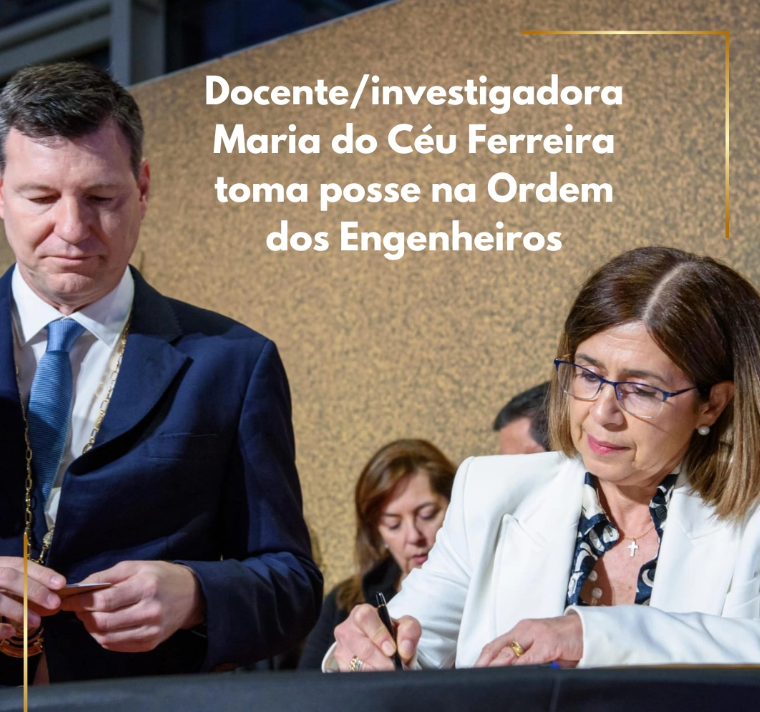
Docente/investigadora Maria do Céu Ferreira toma posse na Ordem dos Engenheiros
No seguimento das recentes eleições para os órgãos nacionais, a equipa EGI tem o gosto de informar que no dia 25 de Março, Maria do Céu Ferreira, docente dos cursos de Licenciatura e Mestrado em Engenharia e Gestão Industrial, da Universidade Lusófona, e investigadora do RCM2+, tomou posse como Coordenadora Nacional da Especialização em Metrologia da Ordem dos Engenheiros. Parabéns à docente Maria do Céu Ferreira e votos de um bom trabalho.
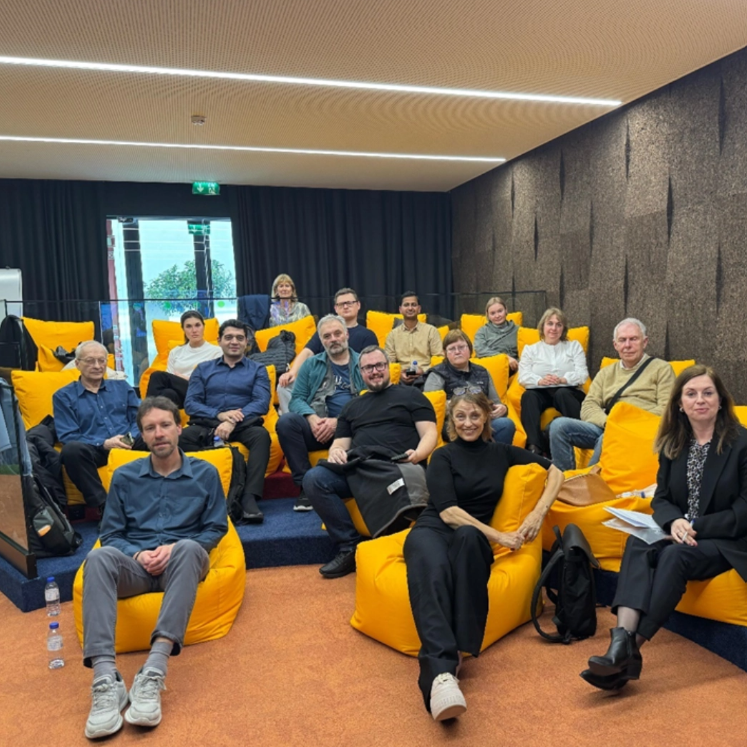
DETMED Mid-Term Meeting in Lisbon
No dia 20 de fevereiro de 2025, a Universidade Lusófona – Centro Universitário de Lisboa recebeu a Reunião Mid-Term do projeto DETMED, uma iniciativa financiada pela Agência Executiva Europeia de Investigação (REA) da Comissão Europeia e coordenada pela própria instituição. O projeto tem como objetivo desenvolver um protótipo inovador de sonda gama compacto e de alta precisão para otimizar a remoção cirúrgica de tumores, aumentando a eficácia no diagnóstico e tratamento do cancro. Através da investigação avançada em optoeletrónica e da aplicação de tecnologias de ponta, o DETMED aposta na colaboração internacional para impulsionar a nova geração de detetores gama de elevada sensibilidade, reunindo especialistas de Portugal, Polónia, República Checa, Eslovénia, Ucrânia, Alemanha, Hungria e Azerbaijão. Durante a reunião, as equipas do consórcio apresentaram os avanços mais recentes do projeto e delinearam os próximos passos a desenvolver nos diferentes Work Packages (WP), com destaque para a preparação e teste de amostras inovadoras de SiPM, a investigação de parâmetros de materiais cintilantes, o desenvolvimento do circuito eletrónico e do sistema de leitura da sonda gama, bem como da gestão global do projeto. Além dos progressos técnicos, os investigadores em mobilidade partilharam as suas experiências e contributos para o avanço da investigação. O evento contou com a participação presencial e online de todas as entidades do consórcio, incluindo a Universidade Lusófona/COFAC (Portugal), CascataChuva LDA (Portugal), Instituto de Química Geral e Inorgânica da Academia Nacional de Ciências da Ucrânia VI Vernadsky (Ucrânia), Nanomaterials Research & Development (Polónia), Elmek Mozgasban Alapítvány (Hungria), Technical University of Dortmund (Alemanha), Instituto Jožef Stefan (Eslovénia), University of West Bohemia (República Checa), Instituto de Problemas de Radiação da Academia Nacional de Ciências do Azerbaijão e SETM LLC (Azerbaijão). A União Europeia esteve representada por um membro da REA, reforçando o compromisso com a inovação e a investigação no combate ao cancro. Com os avanços apresentados, o projeto segue agora para as próximas fases de desenvolvimento, visando revolucionar a precisão dos procedimentos médicos e contribuir para melhorias significativas nos cuidados aos doentes oncológicos. Esteviveram presentes os investigadores do RCM2+ Svitlana Lyubchyk, Andriy Lyubchyk e Sergiy Lyubchyk.
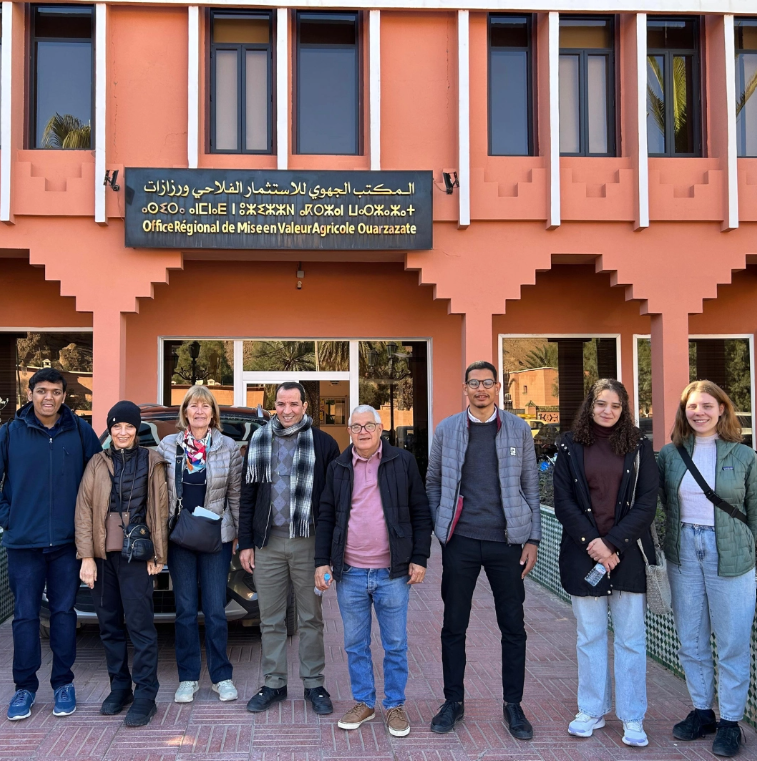
Projeto EWALD: Workshop sobre Monitorização da Degradação da Terra em Marrocos
O workshop sobre monitorização da degradação do solo utilizando QGIS e Google Earth Engine realizou-se entre os dias 10 e 13 de fevereiro de 2025, na Faculdade de Ciências e Técnicas da Universidade Cadi Ayyad, em Marraquexe, Marrocos. Integrado no projeto EWALD (Earth Observation for Early Warning of Land Degradation at European Frontier), coordenado pela Universidade Lusófona e financiado pela União Europeia, o evento reuniu especialistas e investigadores de várias instituições internacionais, incluindo parceiros do projeto, para discutir metodologias inovadoras no uso de sensoriamento remoto e análise geoespacial na monitorização da degradação do solo. O staff do Deep Tech Lab (*) participou no workshop, representando a Universidade Lusófona. O programa iniciou-se a 10 de fevereiro com apresentações sobre as oportunidades e desafios da deteção remota da degradação do solo, conduzidas por Sophia Hueffmeier, e sobre a importância do monitoramento para os Objetivos de Desenvolvimento Sustentável, apresentada por Nikhil Raghuvanshi. No dia 11, os participantes tiveram a oportunidade de aplicar na prática os conceitos apresentados, através de uma sessão prática sobre QGIS e Google Earth Engine, dirigida por Hanna Guehmann. Nos dias 12 e 13 de fevereiro, o workshop culminou numa visita de campo à região de Ouarzazate, onde os participantes puderam observar diretamente os impactos da degradação do solo e aplicar as metodologias discutidas durante o evento. Esta experiência permitiu uma análise mais aprofundada da realidade local e a troca de conhecimento entre investigadores, reforçando a cooperação internacional no âmbito do projeto EWALD. O evento destacou a importância do uso de tecnologias avançadas na monitorização ambiental e reforçou a necessidade de colaboração científica para enfrentar os desafios globais da degradação do solo. (*) - Esteve presente Svitlana Lyubchyk, docente do Mestrado em EGI/Lusófona e investigadora do RCM2+.
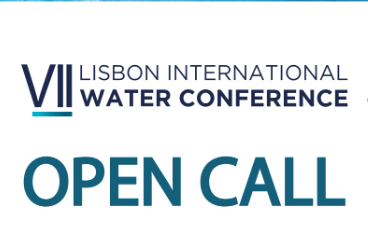
Conferência "ONE WATER: New Water Sources and Nature-based Solutions"
Caros alunos e docentes, É com entusiasmo que os convidamos para a conferência "ONE WATER: New Water Sources and Nature-based Solutions", que terá lugar nos dias 05 e 06 de junho de 2025, em Lisboa. Este evento irá reunir especialistas nacionais e internacionais para discutir para discutir a integração de novas fontes de água e soluções baseadas na natureza no contexto dos desafios globais da gestão da água. Será uma oportunidade única para troca de conhecimento e networking entre académicos, profissionais e decisores políticos. Para mais informações e inscrições, visite: https://lisbonpubliclaw.pt/waterwastelisbon/.
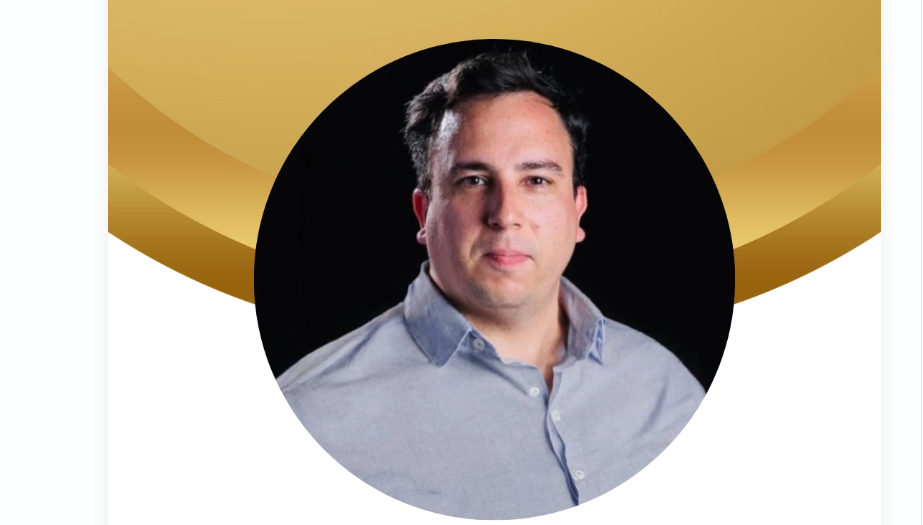
Artigo Científico do Professor Miguel Vieira recebe Prémio Augusto Queirós Novais no IO2024
O artigo científico intitulado “A two-level optimisation-simulation method for production planning and scheduling: the industrial case of a human–robot collaborative assembly line”, de autoria do Professor Miguel Vieira, foi distinguido com o "Prémio Augusto Queirós Novais" 2024. A distinção foi atribuída pela APDIO - Associação Portuguesa de Investigação Operacional, durante o congresso anual de Investigação Operacional (IO2024), realizado em março na Escola Superior de Tecnologia e Gestão do Instituto Politécnico de Viseu. O Prémio Augusto Queirós Novais, um dos mais prestigiados no âmbito da investigação em Process Systems Engineering, visa reconhecer os artigos científicos de maior impacto publicados por sócios da APDIO. Na edição deste ano, o artigo premiado, publicado na conceituada revista International Journal of Production Research, destaca-se pela apresentação de uma metodologia inovadora de simulação e otimização baseada na Abordagem de Otimização-Simulação Recursiva (ROSA). Esta abordagem oferece suporte valioso na tomada de decisões para planeamento e programação da produção, especialmente em linhas de montagem colaborativas entre humanos e robôs, promovendo a integração e a eficiência no contexto industrial. A APDIO, fundada em 1978, é uma associação científica que reúne profissionais e académicos portugueses dedicados à Investigação Operacional. Com cerca de 250 membros, a associação organiza regularmente eventos, como conferências e simpósios, que fomentam o desenvolvimento e a aplicação de metodologias avançadas em áreas como a otimização e a gestão de sistemas complexos. A distinção recebida por Miguel Vieira, Professor do curso de Engenharia e Gestão industrial, e a relevância do seu trabalho evidenciam o impacto da investigação do Centro de Investigação RCM2+ na área da Investigação Operacional e o compromisso contínuo com a inovação tecnológica e metodológica.
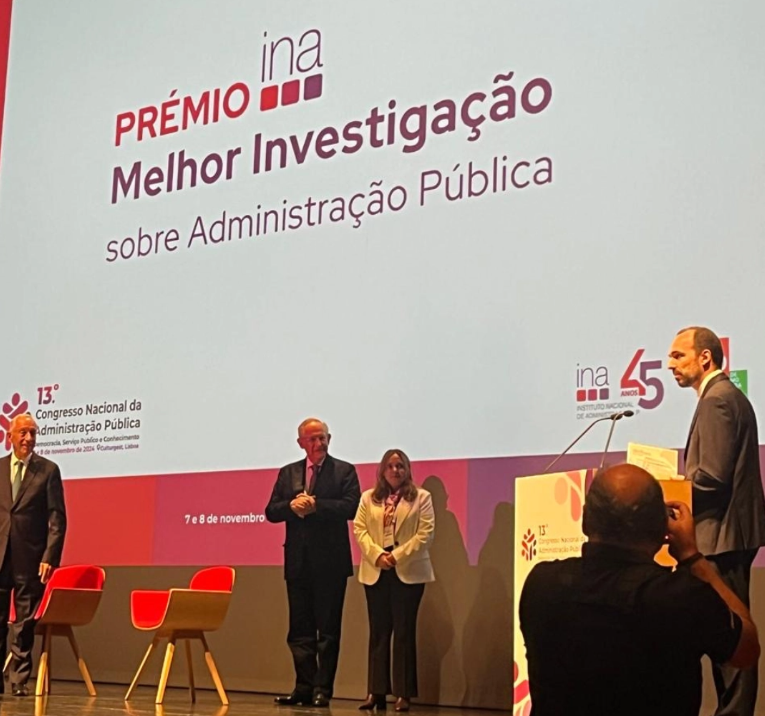
Professor João Reis distinguido com o Prémio INA para a Melhor Investigação em Administração Pública
João Carlos Gonçalves dos Reis, docente do curso de Engenharia e Gestão Industrial (EGI) e investigador do Centro de Investigação RCM2+ da Faculdade de Engenharia da Universidade Lusófona, recebeu no passado dia 7 de novembro o Prémio INA para a Melhor Investigação em Administração Pública. Pelo impacto do tema na área da Administração Pública, o prémio foi-lhe entregue por Sua Excelência o Presidente da República, Prof. Doutor Marcelo Rebelo de Sousa. A distinção foi atribuída durante o 13º Congresso Nacional da Administração Pública, realizado nos dias 7 e 8 de novembro na Culturgest, em Lisboa. Este ano, o evento teve como tema central "Democracia, Serviço Público e Conhecimento" e integrou as comemorações dos 45 anos do Instituto Nacional de Administração (INA) e dos 50 anos do 25 de Abril. O Prémio INA - Melhor Investigação em Administração Pública destina-se a distinguir pessoas singulares cujas teses de doutoramento tenham sido defendidas em instituições de ensino superior em Portugal nos últimos dois anos. Esta edição premiou a melhor tese de doutoramento relacionada com democracia e modernização do Estado, desenvolvida por João Reis, com o título "Da investigação em inteligência artificial à e-Democracia: contribuições para a governação política e modernização do Estado", defendida em novembro de 2023, enquanto doutorando em Ciência Política, no Departamento de Ciências Sociais, Políticas e do Território (DCSPT) da Universidade de Aveiro.
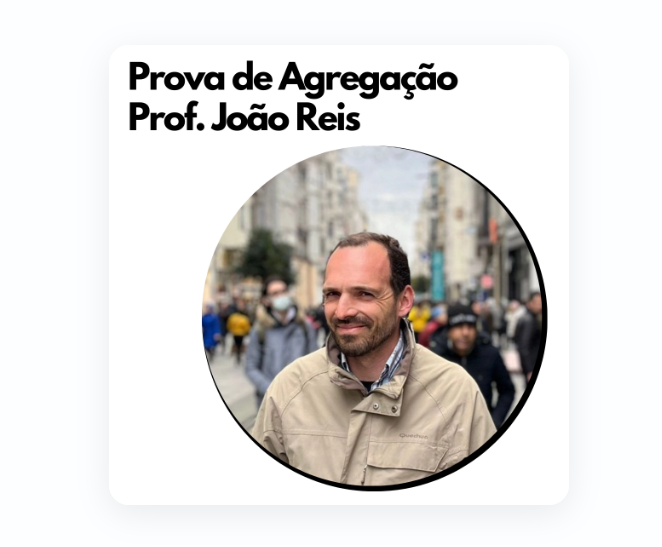
Professor João Reis defende Agregação no ISEG com estudo sobre Logística Militar Sustentável
No passado dia 13 de janeiro de 2025, o professor João Carlos Gonçalves dos Reis defendeu com sucesso a sua Prova de Agregação no Instituto Superior de Economia e Gestão (ISEG) da Universidade de Lisboa. Com o tema "From Sociotechnical Systems to Sustainability: Integrating Green Practices into Military Logistics", a defesa sublinhou a importância das práticas sustentáveis na logística militar, uma área crucial para a inovação e sustentabilidade do setor. O professor João Reis salientou que, embora esta seja uma conquista significativa na sua carreira, ela não é apenas sua, mas de toda a equipa de Engenharia e Gestão Industrial (EGI) com a qual colabora, refletindo o compromisso com a excelência académica e a investigação inovadora nas áreas da EGI. De acordo com ele, trata-se de mais uma validação da credibilidade do trabalho desenvolvido pela equipa do RCM2+ na Universidade Lusófona, que não só enriquece o campo académico, mas também reforça o compromisso com a inovação e a sustentabilidade no domínio da gestão logística, particularmente na logística militar.
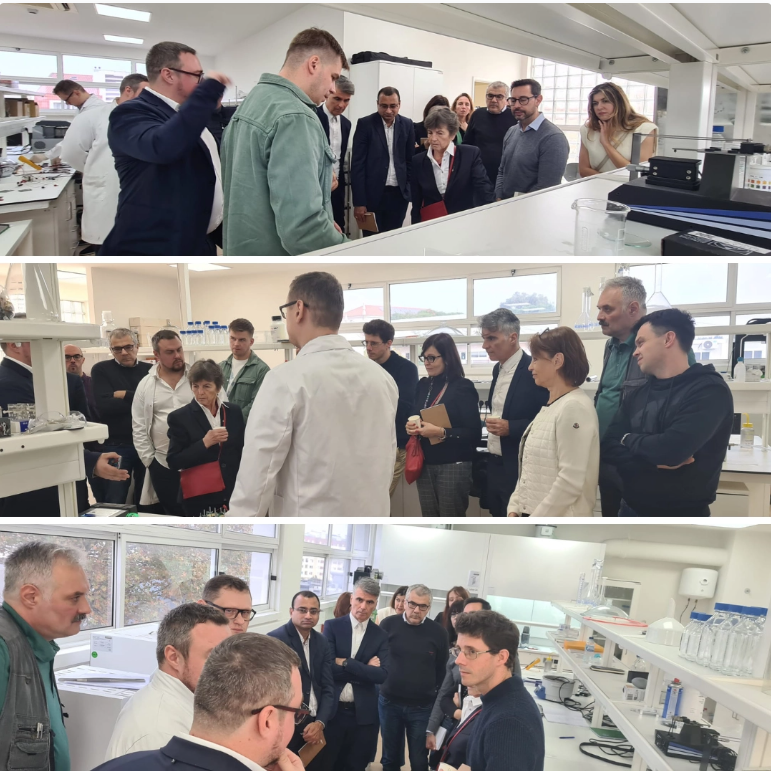
Reunião de revisão do Projeto CATCHER
No passado dia 18 de novembro, a equipa do DeepTechLab, do Centro de Investigação RCM2+, organizou a reunião de revisão do projeto CATCHER na Universidade Lusófona de Lisboa, que contou com a participação de representantes da União Europeia e dos parceiros internacionais do projeto. O CATCHER (Criação de uma Tecnologia Inovadora de Conversão de Energia Renovável de "Humidade para Eletricidade") é um projeto financiado pelo Conselho Europeu de Inovação (CEI) e coordenado pela Universidade Lusófona. A reunião de revisão do RP2 reuniu líderes de equipa do consórcio, dois responsáveis do CEI, quatro monitores científicos e um perito do Radar da Inovação para avaliar o progresso do CATCHER. O evento incluiu apresentações detalhadas sobre os avanços realizados pelos parceiros do projeto, bem como uma demonstração ao vivo do dispositivo inovador desenvolvido. Foram discutidas questões relacionadas à viabilidade tecnológica, ambiental e socioeconómica, além dos esforços de disseminação e do potencial de inovação. Os especialistas e stakeholders participaram em sessões de perguntas e respostas, abordando desafios e revendo os marcos alcançados, com foco no alinhamento com os objetivos do projeto. A reunião culminou com uma sessão de feedback, onde foram destacados os êxitos alcançados e delineados os próximos passos à medida que o projeto avança para a sua conclusão em março de 2026.
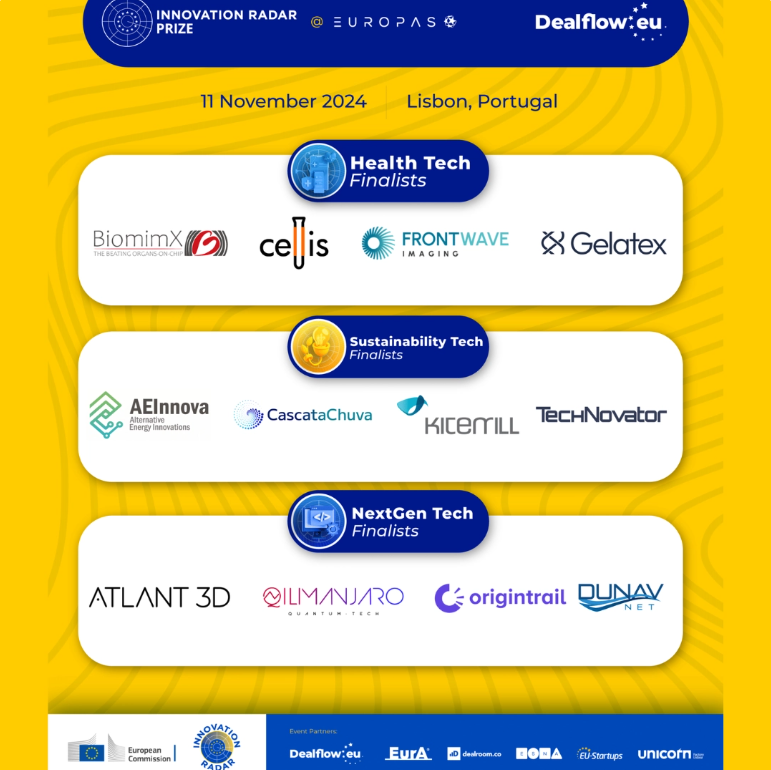
Projeto CATCHER: CascataChuva é finalista do Prémio Radar da Inovação 2024
A startup CascataChuva, membro do consórcio do projeto CATCHER, foi nomeada para a categoria de “Tecnologia de Sustentabilidade” no Prémio Radar da Inovação. Após a votação pública para selecionar os finalistas no final de setembro, foi recentemente anunciado que a CascataChuva está entre os finalistas. O projeto CATCHER, em desenvolvimento no Centro de Investigação RCM2+ e coordenado pela Universidade Lusófona, centra-se no desenvolvimento de uma tecnologia inovadora para explorar a humidade atmosférica e convertê-la diretamente em eletricidade. Esta inovação visa uma utilização eficiente de uma nova fonte sustentável de energia, reforçando a liderança da UE em energias renováveis. Desde 2015, a Comissão Europeia atribui anualmente o Prémio Radar da Inovação a inovadores excecionais financiados pela UE, destacando inovações promissoras que estão a fazer a transição do laboratório para o mercado. Os nomeados são selecionados com base em dados recolhidos pelo Innovation Radar, que identifica inovadores com elevado potencial de mercado. Este ano, a 10.ª edição do Prémio Radar da Inovação será celebrada em Lisboa, juntamente com os prémios Europas 100 Hottest Startups. Durante o evento, 12 startups, incluindo a CascataChuva, irão apresentar as suas inovações, competindo em 3 categorias. O evento contará com painéis e palestras de especialistas líderes no ecossistema de startups da UE. Além disso, os inovadores que competem pelo Prémio poderão também concorrer aos Prémios Europas 100. Fique atento e marque na sua agenda: 11 de novembro na La Destillerie, em Alfama, Lisboa
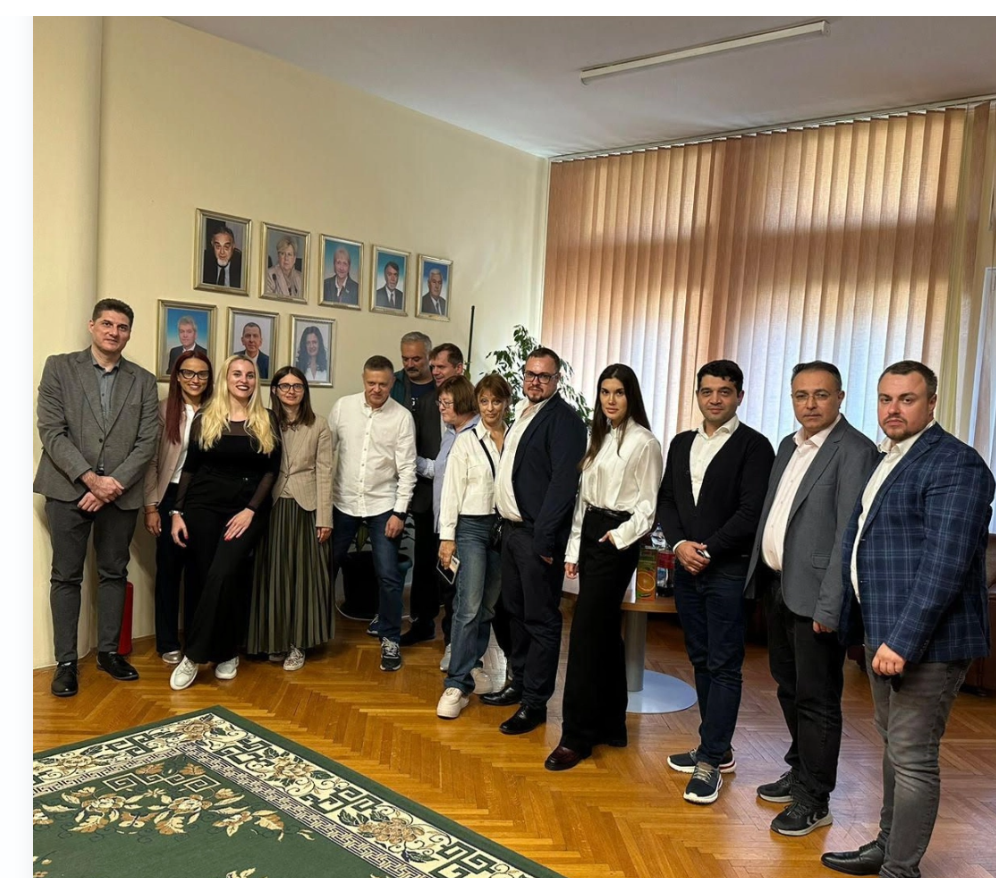
RCM2+ inicia novo projeto E-NOSE: Kick-off meeting em Novi Sad
No dia 7 de outubro, ocorreu a reunião de lançamento do novo Projeto E-NOSE em Novi Sad, Sérvia. O E-NOSE é um projeto financiado pela União Europeia (REA) e coordenado pela Faculdade de Tecnologia de Novi Sad, da Universidade de Novi Sad. O DeepTechLab, integrado no Centro de Investigação RCM2+, da Universidade Lusófona, faz parte do consórcio internacional deste projeto, e esteve representado pelos professores e investigadores Svitlana Lyubchyk, Sergiy Lyubchyk e Andriy Lyubchyk. O E-NOSE (Acquisition and Modification of Hierarchically Nanostructured Oxide Active Materials for Advanced Biological Gas Sensor Project) tem como objetivo desenvolver sensores de gás de última geração utilizando nanotecnologia de ponta: dispositivos "Nariz Eletrónico" altamente sensíveis e rápidos. Mas o projeto vai além do desenvolvimento de sensores — idealiza também um novo sistema global de segurança que integra estes sensores em dispositivos de comunicação móvel, permitindo a deteção altamente localizada de ameaças como surtos epidémicos, incêndios e atividades terroristas. Este projeto conta com a participação de múltiplos parceiros europeus e internacionais (instituições de investigação, empresas e universidades), que estiveram presentes na reunião, tais como: Faculdade de Tecnologia de Novi Sad (Sérvia), NanoTechCenter (Ucrânia), Universidade Bandirma Onyedi Eylul (Turquia), Nanomaterials Research & Development (Polónia), Associação DeepTechLab (Portugal), NanoPhoenix (Itália), Instituto de Ciência dos Materiais da Academia de Ciências do Uzbequistão (Uzbequistão), Instituto de Problemas de Radiação (Azerbaijão) e o Centro Científico e Prático Republicano de Medicina Desportiva (Uzbequistão). Na reunião, foram discutidas várias condições inerentes à parceria entre as organizações, assim como futuros eventos de networking necessários para a continuação do projeto. Esta reunião foi também especialmente importante para a coordenação dos parceiros e das tarefas a serem realizadas por cada um deles para alcançar os marcos importantes no campo da investigação, bem como para discutir os próximos passos a serem tomados no projeto.
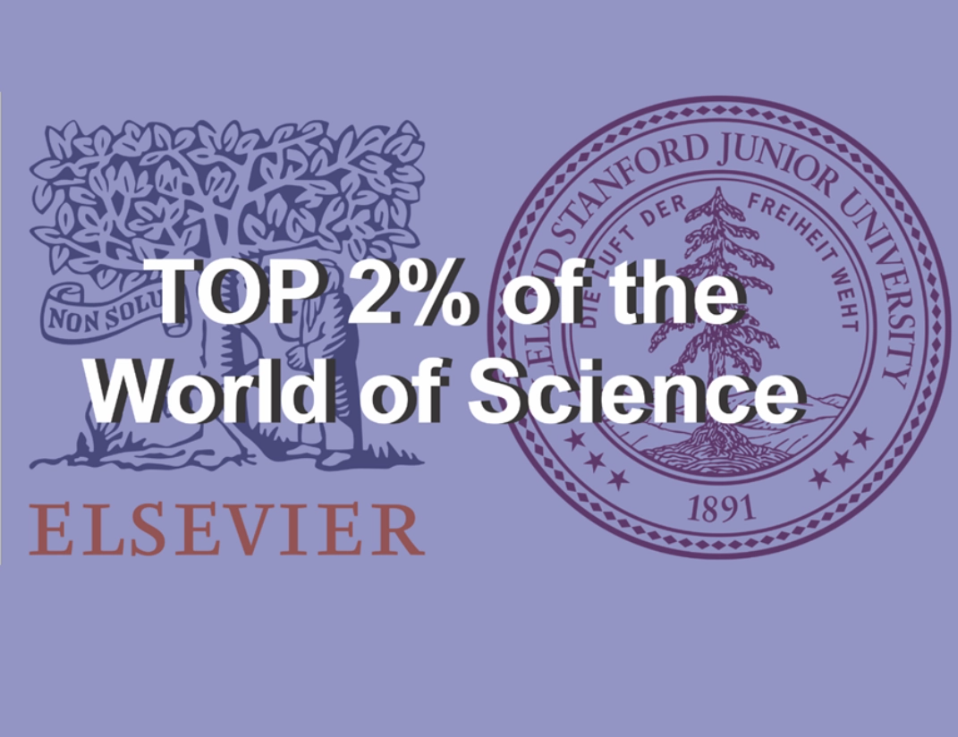
Investigadores do Centro RCM2+ na Worlds Top 2% Scientists list
O Centro de Investigação RCM2+ anuncia com orgulho que dois dos seus investigadores foram classificados entre os 2% dos cientistas mais influentes a nível mundial em 2024. Os investigadores do RCM2+, João Reis (Economia e Gestão) e Rui Cunha Marques (Ciência e Engenharia Ambiental), estão entre os 9 investigadores dos Centros de Investigação da Universidade Lusófona que integram a lista dos mais influentes do mundo. O relatório do estudo, levado a cabo pela Universidade de Stanford (EUA) em colaboração com a editora Elsevier, com base na SCOPUS — a maior base de dados mundial de resumos e citações de publicações científicas até agosto de 2024 — fornece informações padronizadas sobre citações, índice h, índice hm ajustado por coautoria, citações de artigos em diferentes posições de autoria e um indicador composto. Esta edição do “World’s Top 2% Scientists 2024” inclui 889 investigadores ligados a instituições portuguesas, dos quais 9 estão associados a Centros de Investigação da Universidade Lusófona. Este prestigiado reconhecimento destaca o contributo do RCM2+ e da Universidade Lusófona para a investigação e inovação de ponta.
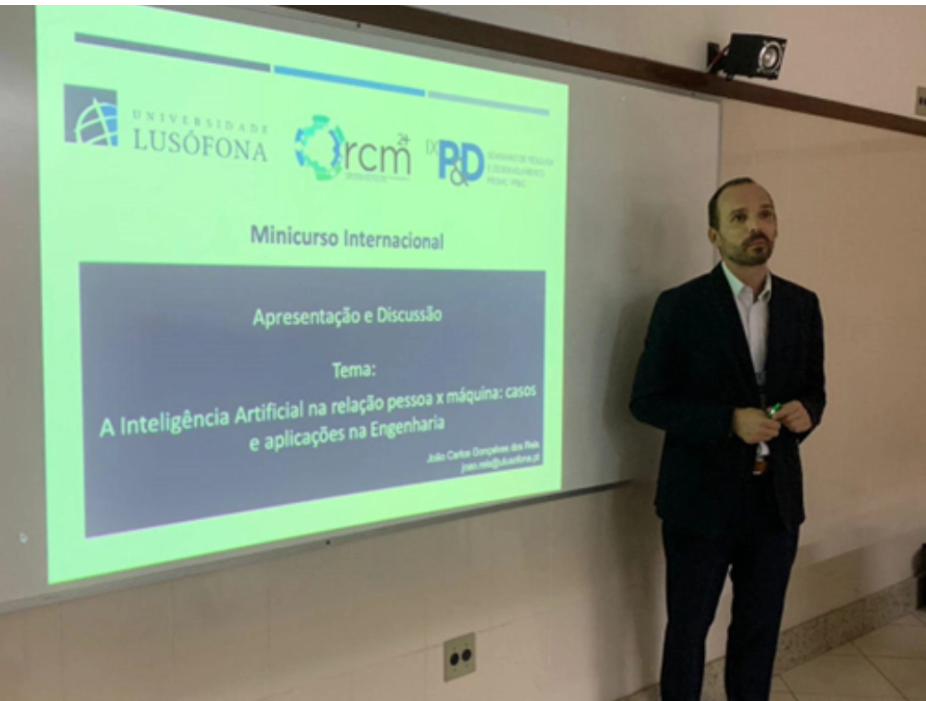
Professor João Reis participa na promoção internacional do Centro RCM2+ no VIII Congresso do Conhecimento Científico
Entre os dias 16 e 19 de setembro de 2024, João Reis, Professor do Curso de Engenharia e Gestão Industrial e Investigador Sénior no Centro RCM2+, participou no VIII Congresso Internacional do Conhecimento Científico (VIII CICC), realizado nos Institutos Superiores de Ensino do CENSA (ISECENSA), uma das maiores universidades privadas do Brasil. O Congresso Internacional do Conhecimento Científico, organizado a cada três anos nos ISECENSA, é um espaço de debate, troca de conhecimento e divulgação de pesquisa de vanguarda, com o objetivo de aprimorar o ensino-aprendizagem e formar profissionais preparados para os desafios do século XXI. Em 2024, o evento explorou como as ciências e tecnologias estão a transformar a investigação científica, as práticas acadêmicas e a sociedade, incentivando reflexões sobre aspetos éticos, sociais e ambientais, além de promover o debate sobre o uso dessas inovações para criar soluções sustentáveis, pacíficas e inclusivas para os desafios globais. O Professor João Reis apresentou uma palestra internacional na qual detalhou a pesquisa do Centro de Investigação RCM2+ no campo da Inteligência Artificial aplicada à Engenharia, com ênfase nos resultados publicados pelo Centro. Além disso, ministrou um mini-curso de três horas direcionado a estudantes de engenharia, destacando a produção científica do RCM2+ nessa área e suas aplicações inovadoras em contextos de engenharia. O caráter internacional do evento foi evidenciado pela presença de 521 representantes externos de diversas universidades, incluindo a Lusófona, a Universidade de Lisboa e a Universidade de Illinois (EUA), somando um total de 2.977 participantes. Foram quatro dias de intensa imersão no conhecimento, networking e valorização do saber.
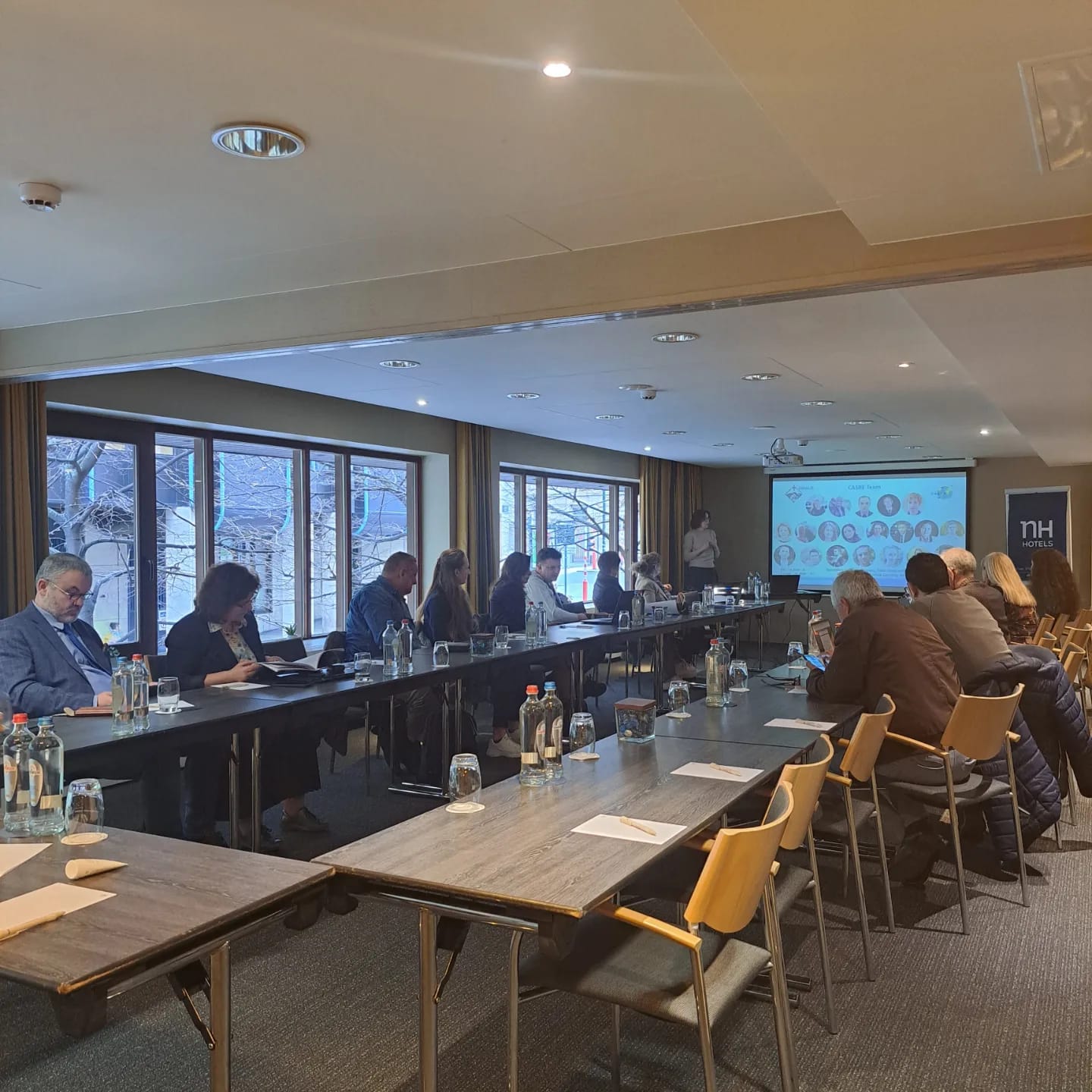
Mid-term do projeto EWALD
No dia 21 de março, teve lugar em Bruxelas a reunião Mid-term do projeto EWALD – um projeto financiado pela Agência Europeia de Investigação Executiva da Comissão Europeia, e coordenado pela Professora Svitlana Lyubchyk da Universidade Lusófona. O principal objetivo do projeto é desenvolver um quadro inovador para fornecer um Sistema de Alerta Precoce e respostas à degradação do solo que ameaça a UE a partir da sua fronteira externa, utilizando dados de Observação da Terra de múltiplas fontes e multi-escalas. A degradação do solo é o maior desafio ambiental do mundo que afeta o ambiente, a agricultura e o bem-estar humano. Intensificada por catástrofes naturais e pela desertificação, a degradação do solo pode representar potenciais riscos e tensões socioeconómicas na fronteira da União Europeia. Na reunião intercalar foram apresentados por todas as equipas do Consórcio os principais avanços do projeto relacionados com os “Work Packages “ da sua responsabilidade, incluindo: Tecnologias; Capacitação; Estratégias e Gestão. Todas as equipes da COFAC (PT), RHEINISCHE FRIEDRICH-WILHELMS-UNIVERSITAT BONN (DE), CENTRO CIENTÍFICO DE PESQUISA AEROESPACIAL DA TERRA DO INSTITUTO DE CIÊNCIA GEOLÓGICA (UA), ZILINSKA UNIVERZITA V ZILINE (SK), LIMITED LIABILITY COMPANY ECOMM CO (UA), RESOURCE ENGENEERING COMPANY (MA), UNIVERSITE CADI AYYAD (MA) do Consórcio estiveram representados na reunião, presencialmente ou online.
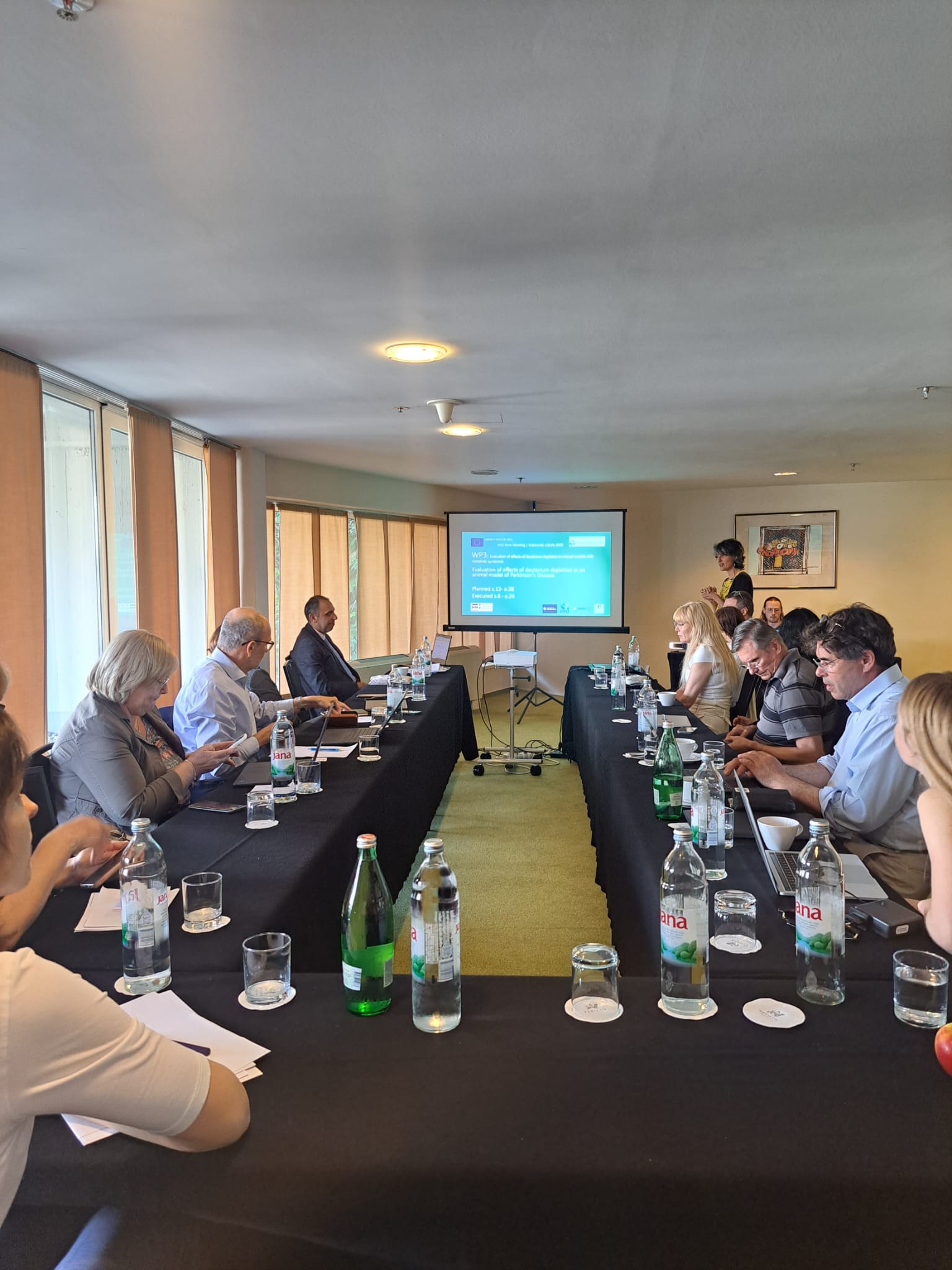
Mid-Term Meeting do projeto Aqua Synapse
Nos dias 27 e 28 de maio, o Mid-Term Meeting do projeto Aqua Synapse teve lugar em Cavtat, Croácia. Aqua Synapse é um projeto financiado pela Agência Executiva de Pesquisa Europeia da Comissão Europeia, e coordenado pelo Professor Sergiy Lyubchyk da Universidade Lusófona. A principal ideia do projeto Aqua Synapse é estabelecer a base mecanicista dos efeitos positivos na saúde da água pobre em deutério. O teor de isótopos da água potável tem demonstrado possíveis implicações em muitas doenças, como o cancro - enquanto altas concentrações de deutério podem induzir disfunção mitocondrial e até levar à morte celular, concentrações mais baixas (água pobre em deutério), no entanto, parecem ter efeitos positivos na saúde humana e parecem representar uma intervenção segura com poucos ou nenhuns efeitos colaterais – mas continua a não ser claro em que concentrações os efeitos metabólicos e comportamentais positivos se tornam aparentes. O projeto visa verificar esta hipótese e desenvolver mecanismos para medir os benefícios para a saúde da água pobre em deutério. Na reunião, os principais progressos do projeto foram apresentados por todas as equipas do Consórcio relacionadas com os Work Packages (WP) da sua responsabilidade, incluindo: espectroscopia metabólica de deutério e imagiologia metabólica de deutério (WP1); impacto do deutério no equilíbrio excitatório/inibitório (E/I) num sistema modelo de rede neuronal humana (WP2); avaliação dos efeitos da depleção de deutério em modelos animais de síndrome metabólica (WP3); avaliação do impacto da depleção de deutério em modelos animais de envelhecimento (WP4); produção de amostras de água pobre em deutério e de controlo, controlo do teor de deutério em tecido experimental (WP5). Foram também discutidos os progressos da equipa de coordenação da Universidade Lusófona na gestão do projeto, particularmente relacionados com o plano de comunicação e disseminação do projeto e o plano de gestão de dados (WP6). Todas as equipas do Consórcio estiveram representadas na reunião, presencialmente ou online, nomeadamente: COFAC (Portugal), Universidade de Oxford (Inglaterra); Universidade de Würzburg (Alemanha); Instituto de Medicina Molecular João Lobo Antunes (Portugal); HYDLLC for Cancer Research and Drug Development (Hungria).
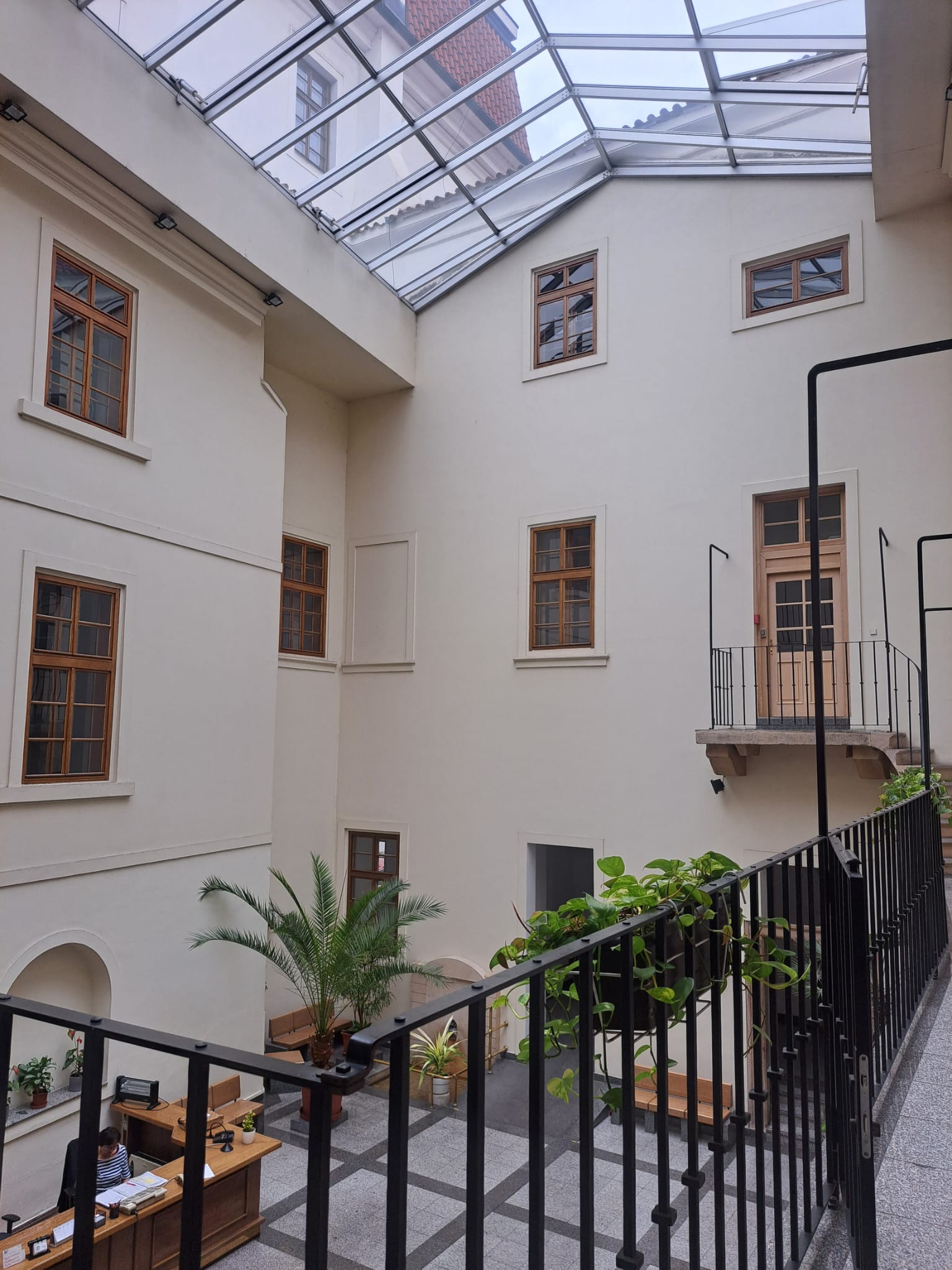
Mid-Term Meeting do projeto INNMEDSCAN
No dia 10 de junho, realizou-se em Praga, República Checa, a Mid-Term Meeting do projeto INNMEDSCAN. O INNMEDSCAN é um projeto financiado pela Agência Executiva Europeia de Investigação da Comissão Europeia, e coordenado pela Professora Svitlana Lyubchyk da Universidade Lusófona. O projeto INNMEDSCAN visa desenvolver um equipamento altamente solicitado nos mercados médicos, um Scanner Híbrido de Ressonância Magnética / Tomografia por Emissão de Positrões (PET-MRI). Para isso, os parceiros pretendem projetar e produzir um novo fotodetetor semicondutor de alta sensibilidade, seguido da elaboração do módulo do protótipo funcional do detetor adequado para a elaboração da próxima geração dos scanners híbridos PET-MRI. Na reunião, os principais avanços do projeto foram apresentados por todas as equipas do Consórcio relacionados com os Work Packages da sua responsabilidade, nomeadamente: Design e Produção de Detetores Inovadores em Escala Piloto; Avaliação dos Parâmetros de Funcionamento dos Fotodetetores Inovadores; Fabrico e Teste de Componentes do Módulo Eletrónico e Desenvolvimento de Software; Montagem do Módulo do Detetor para Scanners Híbridos PET/MRI Inovadores; Teste e Validação do Módulo do Detetor do Protótipo. Além disso, foi também apresentado o progresso da equipa de coordenação da Universidade Lusófona na gestão do projeto, com foco no plano de comunicação e disseminação do projeto e no plano de gestão de dados. Todas as equipas do Consórcio estiveram representadas no encontro, presencialmente ou online, incluindo: COFAC (Portugal), Universidade Bolu Abant Izzet Baysal (Turquia), Universidade Técnica Checa em Praga (República Checa); Universidade da Boémia Ocidental (República Checa); CascataChuva (Portugal); Instituto de Investigação Nuclear da Academia Nacional de Ciências da Ucrânia (Ucrânia); Centro Nacional de Investigação Nuclear CJSC (Azerbaijão); Instituto de Problemas de Radiação da Academia Nacional de Ciências do Azerbaijão (Azerbaijão).
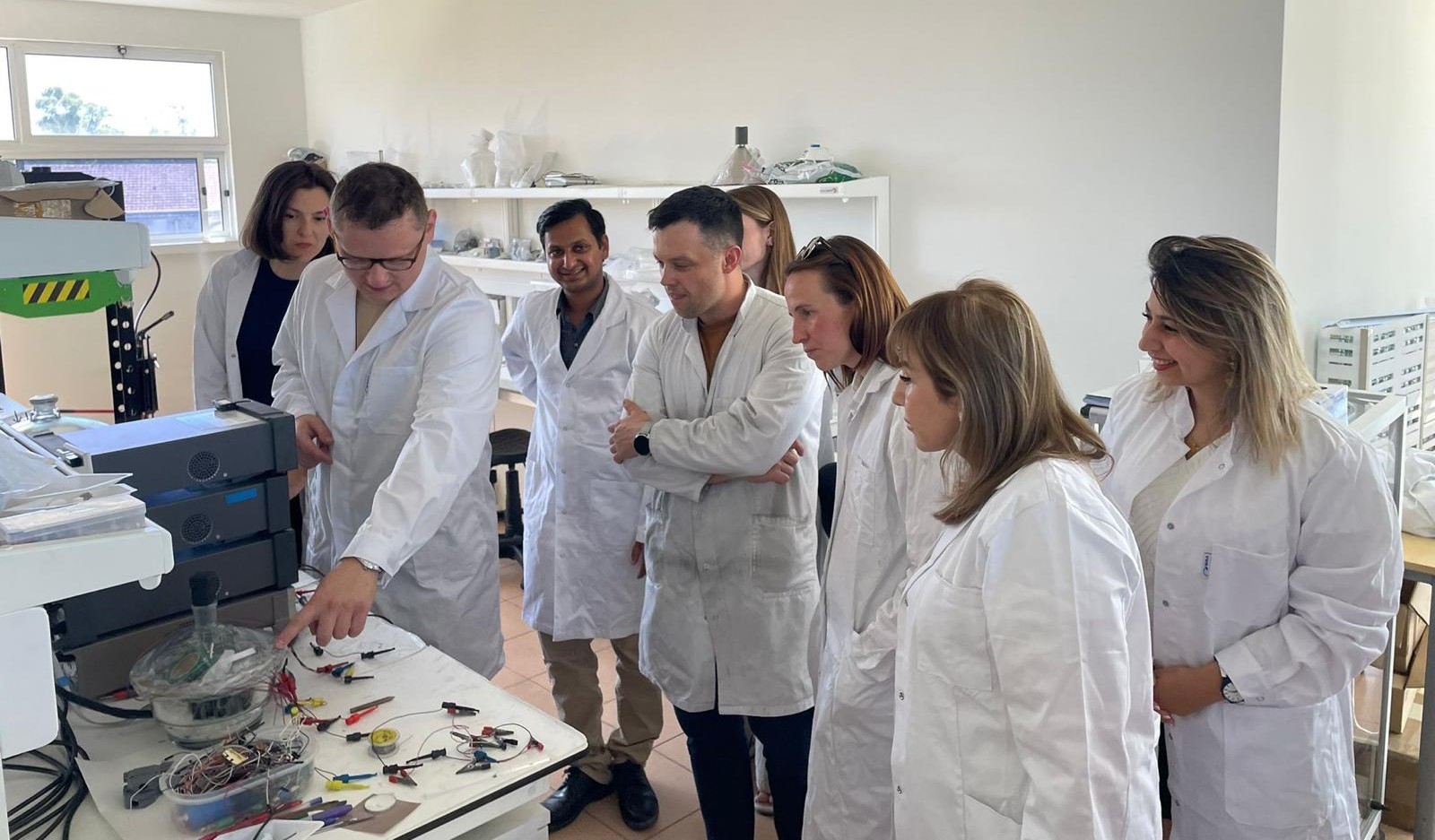
PHYTOAPP SUMMER SCHOOL
De 1 a 3 de julho decorreu na Universidade Lusófona, em Lisboa, a Summer School do projeto PhytoAPP. O PhytoAPP é um projeto financiado pela Agência Europeia de Investigação Executiva da Comissão Europeia, e coordenado pelo Professor Sergiy Lyubchyk da Universidade Lusófona. Ao longo dos três dias, a PhytoAPP Summer School contou com uma sessão de palestras presenciais e online e sessões práticas no Deep Tech Lab. No geral, a Summer School foi uma plataforma para os participantes se envolverem no projeto, partilharem ideias e complementarem os seus conhecimentos teóricos e práticos na área. Houve um total de nove palestras proferidas por especialistas de vários países na área, nomeadamente: Professor Azer Zadigov (Centro Nacional de Investigação Nuclear CJSC, AZ), Professor Daniel Anthony (Universidade de Oxford, Reino Unido), Professor Ziraddin Zadigov (Centro Nacional de Investigação Nuclear CJSC, AZ), Professor Nurbol Appazov (Universidade Estadual Korkyt Ata Kyzylorda, KZ), Professora Tatiana Strekalova (Universidade Estadual Korkyt Ata Kyzylorda, KZ), Professor Gabor Somlyai (HYD LLC para a Investigação do Cancro e Desenvolvimento de Medicamentos, HU), Professora Katarina Siposova (Instituto de Física Experimental, SK) e Dra. Anastasia Tmur (YANDEX, NL). As palestras, que incluíram sessões de perguntas e respostas e debates, abordaram uma série de temas diferentes e muito interessantes relacionados com a Ciência Médica: 1. Benefícios e riscos da radiação para a saúde; 2. Tendências modernas em Medicina Nuclear; 3. Navegando na barreira hematoencefálica: estratégias e desafios na distribuição de fármacos; 4. Perspetivas para a eletrónica de avalanche e a sua aplicação em dispositivos médicos; 5. Utilização potencial de extratos de plantas medicinais de Camelthorn (Alhagi Pseudalhagi) na prevenção e tratamento da aterosclerose em fase inicial; 6. Novos tratamentos com fitoquímicos em modelos de ratos com doenças de Parkinson e Alzheimer; 7. Papel do deutério natural no crescimento e prevenção do cancro; 8. Paradigma Amiloide: Das Estruturas Patológicas aos Bionanomateriais Funcionais; 9. IA na descoberta de medicamentos: acelerando o caminho para a cura. De uma forma geral, como projeto, o principal objetivo do PhytoAPP é a conceção, desenvolvimento e entrega de inibidores fitoquímicos hidrossolúveis inovadores para a prevenção das doenças de Alzheimer e Parkinson, explorando soluções nanotecnológicas inovadoras para superar o desafio relacionado com a limitação do fitoquímico na sua baixa solubilidade em água. Saiba mais no site do projeto!
